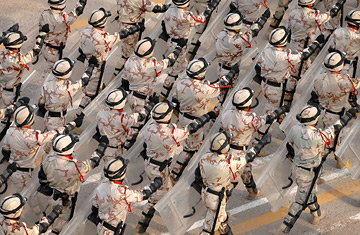
Iraq formally took over security control of the southern oil province of Basra from British forces paving the way for Britain to sharply reduce its nearly 5,000-strong troop presence.
When the Iraqi government took over formal control of Basra Province from the British military on Sunday, the Americans put out a congratulatory and supportive press release. In a joint statement, Gen. David Petraeus and Patricia Butenis, the U.S. Embassy's chargé d'affaires, called the handover "a positive step on the path to Iraq's self-reliance." They added that "the provincial and military leadership in Basra still have work to do and we will assist as requested." Yet on less ceremonial occasions the American attitude toward Basra is far more hands-off, as the U.S. seems prepared to let various political and militant factions fight it out for control of the city.
That doesn't mean that the departure of British troops will be followed by an immediate increase in violence. The British, after all, gave up their bases inside the city last summer and have been hunkered down on a base at Basra's airport ever since. Even before that, they treaded lightly in Basra.
That low-key approach seemed to pay dividends in the early years of the war, when relative peace in Basra contrasted with escalating violence in areas where the Americans employed more aggressive tactics. But it ultimately became clear that the British were bystanders to a turf war that involved militias loyal to the Supreme Islamic Iraqi Council (SIIC), followers of the cleric Moqtada al Sadr, and the smaller Fadhila party.
SIIC and the Sadrists are major players in the national government, and earlier this month a senior U.S. official laid the blame for the "mess" in Basra at their feet. "This government, the Shi'a parties, have failed to act responsibly," the official told reporters. And while he pointed to signs that the various factions were trying to bring the situation under control — borne out to some extent by a recent announcement of a truce in the city — it is unlikely that those factions are ready to lay down their arms and cooperate. Basra Province contains the lion's share of Iraq's oil and its only port. It's a tempting prize for groups that have shown more enthusiasm for fighting than for compromise.
So Basra will continue to be a high-stakes front in the intra-Shi'a fight for control of southern Iraq. That fight has largely escaped the notice of Americans — both because U.S. troops are not on the front lines and because the violence has not reached the appalling levels seen in other parts of the country.
But the violence in southern Iraq gives the lie to the idea that simply relinquishing control of a province constitutes progress. The local governments and security forces in these provinces do not represent some ideal of unified Iraqi control so much as they represent control by one faction or another. Assassinations of provincial governors and battles involving the Iraqi police are manifestations of militia violence, not evidence that the Iraqi government is facing down terrorists or militants.
But the Americans have no military presence in these provinces and no influence with local militias or politicians. There is no chance that they could cultivate the kinds of grassroots alliances that sparked the stunning turnaround in the U.S. fight against Sunni jihadists. Since the Americans have no leverage in these conflicts, they also have no incentive to pick sides. So the Basra handover is an opportunity for the U.S. to wash its hands of a "mess" for which it has no solution. "This one is on the Iraqis" the American official said of Basra. "It's not up to us to fix this one."
